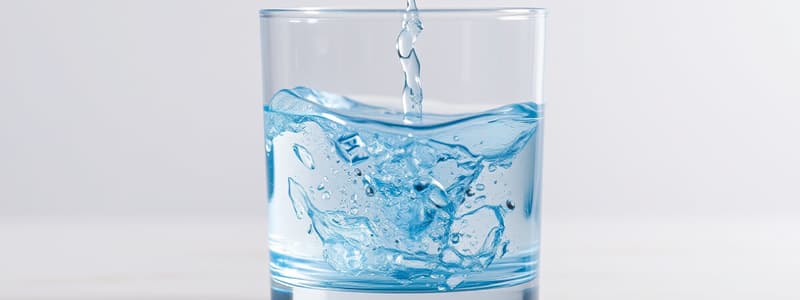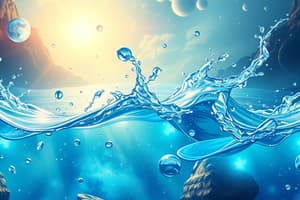Podcast
Questions and Answers
What is the value of the equilibrium constant for the autoionization of water at 25 ℃?
What is the value of the equilibrium constant for the autoionization of water at 25 ℃?
- 1.0×10−14 (correct)
- 1.0×10−10
- 1.0×10−12
- 1.0×10−7
At 25 °C, what is the relationship between the concentrations of H+ and OH− in pure water?
At 25 °C, what is the relationship between the concentrations of H+ and OH− in pure water?
- [H+] > [OH−]
- [H+] < [OH−]
- [H+] + [OH−] = 2.0×10−7
- [H+] = [OH−] (correct)
Which of the following options correctly describes a strong acid in relation to Kw?
Which of the following options correctly describes a strong acid in relation to Kw?
- [H+] = [OH−]
- [OH−] > [H+]
- [H+] < 1.0×10−7
- [H+] > [OH−] (correct)
How is pH defined in relation to the concentration of hydrogen ions in a solution?
How is pH defined in relation to the concentration of hydrogen ions in a solution?
What is the pH of an acidic solution at 25 °C if [H+] is significantly higher than 1.0×10−7 M?
What is the pH of an acidic solution at 25 °C if [H+] is significantly higher than 1.0×10−7 M?
What is true about strong acids in terms of ionization?
What is true about strong acids in terms of ionization?
What is the pH of a neutral solution?
What is the pH of a neutral solution?
Which pair correctly lists a weak acid and its formula?
Which pair correctly lists a weak acid and its formula?
Which of the following is classified as a strong base?
Which of the following is classified as a strong base?
What is a characteristic of weak acids?
What is a characteristic of weak acids?
Which of the following bases is NOT considered strong?
Which of the following bases is NOT considered strong?
Which ionization equation correctly represents a strong acid?
Which ionization equation correctly represents a strong acid?
Which of the following statements is true about acidic solutions?
Which of the following statements is true about acidic solutions?
What defines a conjugate acid?
What defines a conjugate acid?
What is the main characteristic of a buffer solution?
What is the main characteristic of a buffer solution?
In which scenario does a buffer neutralize added strong acid?
In which scenario does a buffer neutralize added strong acid?
Which of the following illustrates a buffer preparation?
Which of the following illustrates a buffer preparation?
What happens to the pH when a buffer has water added?
What happens to the pH when a buffer has water added?
Which statement is true about the bicarbonate buffer system in human blood?
Which statement is true about the bicarbonate buffer system in human blood?
What is an example of a conjugate acid?
What is an example of a conjugate acid?
How do buffers function when a strong base is added to the solution?
How do buffers function when a strong base is added to the solution?
What characteristic of water allows it to maintain a higher boiling point compared to similar substances?
What characteristic of water allows it to maintain a higher boiling point compared to similar substances?
Which type of interaction occurs between nonpolar molecules in an aqueous environment?
Which type of interaction occurs between nonpolar molecules in an aqueous environment?
What is the primary reason for water's ability to act as a versatile solvent?
What is the primary reason for water's ability to act as a versatile solvent?
Which statement best describes cohesion as a property of water?
Which statement best describes cohesion as a property of water?
What do the most abundant elements in the human body primarily account for?
What do the most abundant elements in the human body primarily account for?
Which type of bond is specifically defined as the electrical force between oppositely charged ions?
Which type of bond is specifically defined as the electrical force between oppositely charged ions?
How do water molecules exhibit adhesion?
How do water molecules exhibit adhesion?
Which feature of water is most crucial for temperature regulation within living organisms?
Which feature of water is most crucial for temperature regulation within living organisms?
Which type of bond occurs due to the attraction between a hydrogen atom and an electronegative atom?
Which type of bond occurs due to the attraction between a hydrogen atom and an electronegative atom?
What defines a polar molecule?
What defines a polar molecule?
What is the primary function of the bicarbonate buffer system in human blood?
What is the primary function of the bicarbonate buffer system in human blood?
What can lead to respiratory acidosis?
What can lead to respiratory acidosis?
How does metabolic alkalosis typically occur?
How does metabolic alkalosis typically occur?
What is the relationship between pH and pOH in an aqueous solution?
What is the relationship between pH and pOH in an aqueous solution?
Which of the following correctly describes the process of acidosis?
Which of the following correctly describes the process of acidosis?
What is the dissociation reaction for carbonic acid in the blood buffer system?
What is the dissociation reaction for carbonic acid in the blood buffer system?
Which laboratory measurement is primarily used to diagnose acid-base balance disorders?
Which laboratory measurement is primarily used to diagnose acid-base balance disorders?
In metabolic acidosis, which of the following is a potential cause?
In metabolic acidosis, which of the following is a potential cause?
What pH range can lead to death in human blood?
What pH range can lead to death in human blood?
Flashcards are hidden until you start studying
Study Notes
Properties of Water
- Water is a polar molecule with the chemical formula H2O, consisting of one oxygen and two hydrogen atoms.
- It has unique properties like cohesion (water molecules sticking to each other) and adhesion (water molecules sticking to other substances).
- Water’s boiling point is 100°C, higher than many similar substances due to hydrogen bonding.
- High specific heat allows water to regulate temperature and maintain homeostasis effectively.
- It serves as an excellent solvent for polar molecules, facilitating chemical reactions within cells.
Interactions and Bonding
- Covalent bonds involve the sharing of electron pairs between atoms (e.g., H2).
- Ionic bonds arise from the electrical attraction between oppositely charged ions (e.g., NaCl).
- Hydrogen bonds are attractions between a hydrogen atom with a partial positive charge and an electronegative atom (e.g., in water).
- Hydrophobic interactions describe the tendency of non-polar molecules to aggregate in water, as seen with lipids.
- Van der Waals forces are weak, distance-dependent interactions between atoms and molecules.
Ionization of Water, Acids, and Bases
- Water can act both as an acid and a base due to its polar structure.
- Equilibrium constant of water (Kw) at 25°C is 1.0 × 10^−14, indicating equal concentrations of H+ and OH− in pure water ([H+] = [OH−] = 1.0 × 10^−7).
- pH measures hydrogen ion concentration; neutral solutions have a pH of 7.
- Strong acids (e.g., HCl) and strong bases (e.g., NaOH) completely ionize in solution.
Weak Acids and Weak Bases
- Weak acids partially dissociate in solution (e.g., acetic acid, HCOOH).
- Weak bases operate similarly, only partially dissociating (e.g., ammonia, NH3).
- Substances like water can also act as both an acid and a base, depending on the context.
Buffer Systems and Mechanism of Blood pH
- Buffers are solutions that resist pH changes when acids or bases are added, typically composed of a weak acid and its conjugate base.
- Example: Phosphate buffer maintains a physiological pH of 7.4.
- Human blood utilizes a carbonic acid-bicarbonate buffer system to maintain blood pH between 7.35 and 7.45, critical for survival.
Disorders of Acid-Base Balance
- Acidosis occurs when blood pH drops below 7.35, with types including:
- Respiratory acidosis: Due to CO2 accumulation from respiratory issues (e.g., pneumonia).
- Metabolic acidosis: Caused by acid excess or bicarbonate loss (e.g., diabetic ketoacidosis).
- Alkalosis occurs when blood pH exceeds 7.45, with types such as:
- Respiratory alkalosis: Due to excessive CO2 loss from hyperventilation.
- Metabolic alkalosis: Resulting from excess bicarbonate or acid loss (e.g., prolonged vomiting).
Diagnosis and Treatment
- Diagnosis of acid-base disorders involves arterial blood gas analysis.
- Treatments may involve administering bicarbonate for acidosis or acidifying agents, adjusting ventilation for respiratory issues, and providing intravenous fluids to correct metabolic imbalances.
Studying That Suits You
Use AI to generate personalized quizzes and flashcards to suit your learning preferences.




